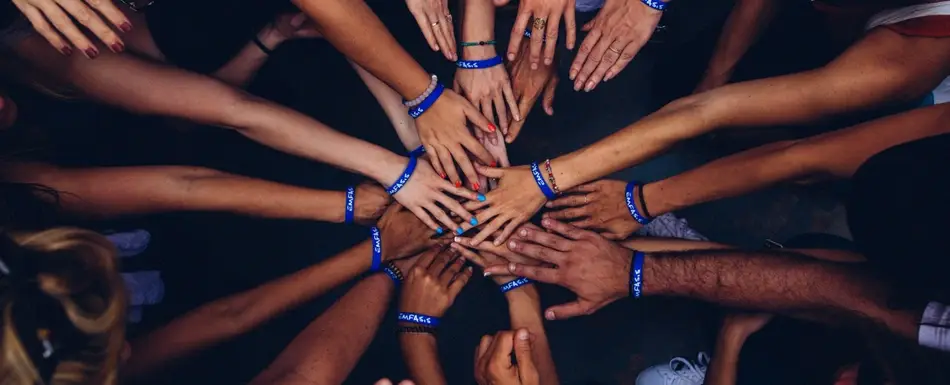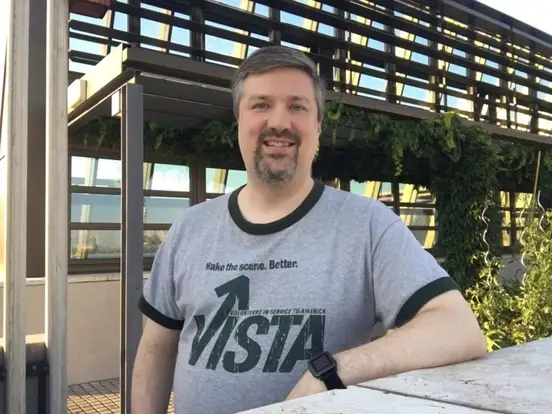Is a National Service Year for You? Tips from an AmeriCorps Alum

Are you in the midst of earning a degree, but unsure about the career direction you want to take after graduation? Or are you looking to make a change from your current day-to-day? Then a national service year might be just what you’re looking for.
Mark Wilson is a three-time AmeriCorps VISTA alumnus. He later went on to work for the Corporation for National and Community Service (CNCS) as a VISTA program specialist in Washington, DC, supporting federal-level departments in their efforts to serve people experiencing poverty.
Mark chatted with Idealist Careers about his AmeriCorps experience, and gave us some advice for people interested in pursuing a similar path.
The road to national service
Mark’s journey to AmeriCorps began after he finished his bachelor’s degree. He was working in a retail position where he saw no future—the job wasn’t interesting and didn’t relate to his education. An avid biker, he was also volunteering at the Community Cycling Center in Portland, Oregon, where some AmeriCorps volunteers were working on staff. After hearing about their experiences, he decided to give national service a try himself.

“I was pretty disillusioned with the world at that time in my life, and I was especially wary of anything government-related,” Mark told Idealist Careers. "So the more I learned about how AmeriCorps was helping communities and how I could help create that kind of change and do it in a non-political way, that was really appealing.”
Mark applied for several positions, and ended up in his first service year with Friends of the Children as an Analysis and Research Assistant. There, he helped facilitate data collection and clean-up for their first ever nationwide third-party evaluation.
Pushing for change
With his appetite for social change whetted, Mark went on to do two more service years—this time at the Native American Youth and Family Center (NAYA), serving as the VISTA team leader for eight VISTA members during the inaugural year of a new three-year project.
“The most significant aspect of the project was to build capacity for the founding year of the NAYA Early College Academy,” Mark said. “I felt incredibly fortunate to be there from the very beginning for the realization of something that had been a dream for over 30 years for the native community in Portland.”
As a team leader, Mark also volunteered to assist at regional trainings for cohorts of new AmeriCorps members before their service year. These pre-service orientations focused heavily on transformational leadership, and offered growth opportunities for all involved.
“I’m still amazed at the kind of magic that used to happen when a hundred AmeriCorps members got together in one big room. We were just allowed to meet each other and talk about service,” Mark said. “The magic isn’t in the bureaucracy, or the trainers, or even the mission—it’s in getting a diverse group of people together to get things done.”
Finding what’s next
For all the good experiences Mark had in AmeriCorps, transitioning into full-time paid work afterwards was a bumpy ride. “For the first year after AmeriCorps, I really struggled,” he said. “I worked a part-time nonprofit job and then a temp job at a different nonprofit.”
As an AmeriCorps alum, Mark was eligible for one year of noncompetitive eligibility, meaning he could be hired for a government position outside of the formal competitive hiring process. “I had applied for some federal positions and interviewed for a few jobs at CNCS during that year, and right at the end of my period of non-competitive eligibility, I was selected for the job at VISTA headquarters in DC. I know that my willingness to step up at trainings and to be helpful—not just at my site but for CNCS—was a big part in making that leap.”
Building a skillset
Mark took away several skills from his service years that served him well in DC. For one, he learned to have faith in the process of federal government bureaucracy, even when it was slow and unwieldy. The programs might have involved a lot of planning and paperwork, but Mark said the reward was worth it.
“It paid off big in the ability to help feed and tutor tens of thousands of kids in the Summer Food Service Program, to help save hundreds of homes with HUD, or to build the capacity of hundreds of food banks nationwide,” he said. “And I was able to advocate for bringing resources to native communities across the country as well, so a lot of things came full circle.”
Mark's AmeriCorps experience also gave him invaluable experience in managing interpersonal relations and conflicts. AmeriCorps engages volunteers in conflict management trainings and diversity trainings to ensure they can overcome on-the-job challenges.
“Some conflicts are worth having and some just aren’t, and there is a lot of wisdom in knowing the difference between the two,” Mark said. “It gave me a chance to overcome those conflicts with professionalism.”
A worthwhile experience
So, if he had a chance to make his choices all over again, would he still choose to live on the poverty-level stipend that national service provides?
“I’ve gone on to do a lot of things that I’m proud of and to create programs that have helped thousands of people,” he said. “Without the opportunity provided by AmeriCorps, I’m sure that I’d still be working retail and none of that would have ever happened.”
Mark recently completed his master’s in business analytics at Central European University in Budapest, Hungary, and he looks forward to returning to the U.S. to serve social progress in new ways.
Mark’s tips for a successful service year
Has Mark’s story piqued your interest in a service year? He has a few tips to get you started—and help you come out on top:
Before:
- Create a budget: By design, AmeriCorps members live on a poverty-level monthly stipend. Be sure you can afford to finish the year, and have a backup plan for any emergencies.
- Do a reality check: Realize it’s not all idealism and good vibes. Like any work, there’s going to be drama and there might be clueless managers, and part of the learning experience is overcoming all of that.
- Take it seriously: Know that this is a real commitment, not an “easy” gap year. Then evaluate if it’s the right fit for you. The nonprofits that apply for AmeriCorps support apply for a reason, and sometimes that means that the work will be rough. The communities that need AmeriCorps are vulnerable communities and already face too many broken promises.
During:
- Make the most of it: Go to every conference or training you can. If there isn’t one near you, connect with other AmeriCorps members in your area and create something yourself, whether that’s connecting by Skype or webinar.
- Get in touch: Know the name and contact information of CNCS grant officers in your state. As CNCS consolidates its offices because of austerity politics, members will have less human connection locally. It’s important to communicate with CNCS points of contact so they know what’s happening on the ground.
After:
- Take the credit: When it comes to your resume, don’t be humble—take credit for the work you did. If you’re not sure how much credit is too much, consider what your supervisor would say if they were the one writing your resume.
- Stay connected: Hopefully you’ve built good relationships with supervisors, teammates, and other people in the community. Stay in touch, because your network is one of the best ways to find employment opportunities post-AmeriCorps.
Pro Tip: Ask for a copy of your project’s grant application. It can show you how your service year is part of a larger plan, and help you translate your work into “resume language”.
***
Are you considering a year of national service? Tweet us your questions!
Ashley Fontaine is a writer, mental health professional, and former nonprofit executive director. She’s on a mission to eliminate “we’ve always done it that way” from our collective vocabulary by helping leaders focus on possibilities rather than limitations. She believes organizational culture is the key to productivity and staff retention.


